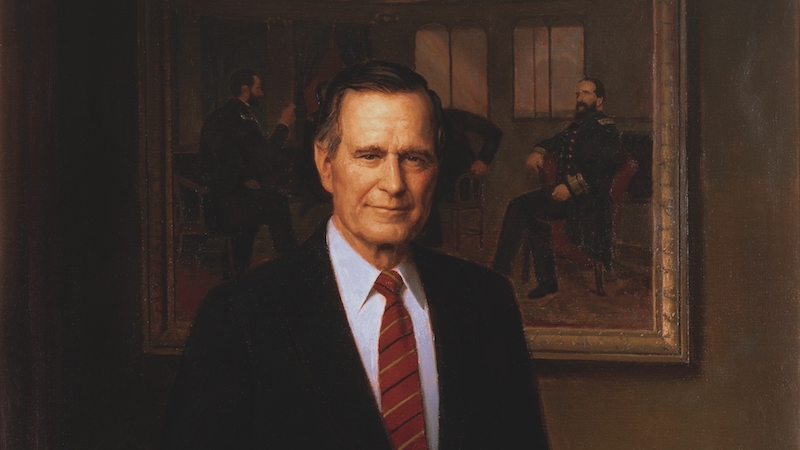George H. W. Bush (1989-1993)
Episode #9 of the course Greatest US presidents by Patrick Allitt
Presidents who serve only one term seem, at first glance, to be failures. But George H. W. Bush, although he lost to Bill Clinton in 1992, deserves a place on the list for three great achievements in foreign policy and one in domestic policy. The ultimate Washington insider before the presidency, Bush had served in Congress as an ambassador, as Chairman of the National Republican Committee, as Director of the CIA, and as vice president to Ronald Reagan before winning the top job in 1988.
By the time of Bush’s inauguration, the Soviet Union was on the brink of collapse after more than 40 years of Cold War rivalry with the United States. Such moments are fraught with danger; the failing regime might use war against external enemies as a pretext to hold on to power. But as the Berlin Wall fell, Soviet leader Mikhail Gorbachev did not attempt to salvage his fortunes by war.
Bush reciprocated by doing everything possible to de-escalate the danger, avoiding self-congratulation and US gloating. The lack of an American victory parade made good political sense. The two leaders met on the Mediterranean island of Malta in 1989 and two years later, signed the Strategic Arms Reduction Treaty in Moscow. The effect was to ease the transition from Communism and to make the world’s strategic situation incomparably safer.
Bush’s second foreign-policy challenge came the following year, in 1990, when Iraqi dictator Saddam Hussein invaded neighboring Kuwait. American and European dependence on Middle Eastern oil made the area significant to the world’s major economies. Bush at once enlisted the United Nations to create a broad coalition of nations dedicated to resolving the situation and restoring Kuwait’s independence. For months, the coalition ratcheted up sanctions against Iraq; in early 1991, it launched air raids against the aggressors.
American-led coalition forces under General Norman Schwarzkopf invaded Kuwait in February 1991, winning a rapid and overwhelming victory, ejecting Iraqi forces and forcing them into headlong retreat. For the first time, “smart” bombs and other high-tech weapons were used to maximize the Americans’ impact and minimize casualties. After only four days of ground fighting, the war was effectively over.
Some advisors and pundits urged Bush to pursue Hussein into Iraq and overthrow his odious regime once and for all. In his third decisive act, Bush refused. He insisted that the liberation of Kuwait was the mission on which the UN forces had agreed and to exceed it might lead to a years-long project of trying to run Iraq, with unforeseeable consequences. Later experience during his son’s presidency would demonstrate the wisdom of this decision.
In domestic policy, George H. W. Bush’s most important achievement was passage of the 1990 Clean Air Act, legislation that he had recommended the previous year. Since the creation of the Environmental Protection Agency in 1970, air quality had improved, but serious problems remained: of Chlorofluorocarbons (CFCs) that damaged the ozone layer, of acid rain, and of toxic gas emissions from vehicles and factories. The market-oriented “cap and trade” approach to pollution mitigation in this act has proven extremely effective, making the American atmosphere incomparably cleaner and healthier than it was in the 1970s and 1980s.
Bush lost the 1992 election after signing legislation in favor of new taxes, in violation of an earlier pledge. The easing of international tensions during his administration made them seem harder to justify than in the arduous Cold War years. In retrospect, however, it is clear that Bush presided effectively over one of the most dangerous moments in 20th-century history and emerged from it with the United States as undisputed leader of the New World Order.
Our tenth and final great president, Barack Obama, will be the topic of tomorrow’s lesson—the first African-American (and the first member of any ethnic minority) to be chief executive.
Recommended book
Destiny and Power: The American Odyssey of George Herbert Walker Bush by Jon Meacham
Share with friends

